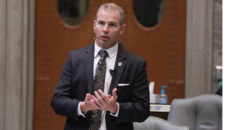KANSAS CITY, Mo. – The “Strengthening Missouri Families Act,” which seeks to modify provisions of the Temporary Assistance for Needy Families (TANF) program and the Supplemental Nutrition Assistance Program (SNAP), was vetoed by Governor Jay Nixon today at Operation Breakthrough in Kansas City.
“Children already suffer lifelong consequences from poverty; penalizing them further for their parents’ behavior is mean-spirited and just plain wrong,” said Gov. Nixon. “When it comes to adults, we can all agree on the need for personal responsibility, but these are children. I don’t sign bills that hurt kids – period.”
The bill sought to reduce the lifetime limit for TANF benefits to 45 months without providing an exception for children. As a result, if SB 24 became law, Nixon said approximately 6,465 children would be cut off from benefits on January 1, 2016. An estimated 40 percent of these children are under the age of five. In addition, the bill would also impose a penalty on the child of a parent who fails to engage in work activities and fails to authorize, as it has in other circumstances, a protective payee to receive and administer the child’s share of the benefits.
“Missouri’s sorry distinction as last in the nation in working for welfare requires us to act,” said bill sponsor Sen. David Sater, R-Cassvill. “The governor is sticking to the status quo; a broken welfare system that discourages work and needlessly creates welfare dependency.”
Bill critics call the bill “mean-spirited and unnecessary,” while supporters – including House and Senate leaders – say the bill is a necessary reform to ballooning welfare costs. Sater called SB 24 “a comprehensive reform of our welfare system that emphasizes work while breaking down barriers to self-sufficiency.”
“Missouri has failed to implement many of the reform policies adopted by other states,” said Senate Majority Leader Ron Richard, R-Joplin. “As a result, we rank dead last in the country in welfare reform policies. We need to restructure our system, reinvest the savings back into the system and get people back into the work force.”
“Right now, Missouri allows two years to go by before requiring our welfare population to work,” Sater wrote in a recent column. “The first thing my bill would do is require a recipient to engage in one of those work activities before even receiving welfare benefits. My bill also lowers the lifetime eligibility limit for the program. Missouri currently allows the maximum eligibility limit of five years on welfare while 12 other states limit lifetime eligibility to four years or less with our neighbors, Arkansas and Indiana, limiting benefits to two years. ”
Sater said these reforms would fix a faulty system.
“I am deeply disappointed with the governor’s veto of Senate Bill 24. Missouri’s sorry distinction as last in the nation in working for welfare requires us to act. Senate Bill 24 will give our families the structure and tools they need to succeed by emphasizing work and personal engagement. Instead of embracing the Legislature’s proactive reform of our welfare system, the governor is sticking to the status quo; a broken welfare system that discourages work and needlessly creates welfare dependency.”
The Heartland Institute, a libertarian-leaning think-tank, came to Missouri to support the bill. The group estimates welfare rankings could jump Missouri from 50th up to 23rd if SB 24 were signed or overriden.
“For 20 years, Missouri has unsuccessfully provided an incentive for people to get back to work,” said Dempsey. “This plan would give a structure to get people back to work and reinvest the savings in childcare, job training, and the kind of services that will help people find employment.”
Logan Pike from the Heartland Institute took to Twitter to express her disappointment.
“Sad to see a Gov. veto a bill that would keep Missouri last in the country for moving people out of poverty,” Pike tweets.
Yet Empower Missouri, a statewide social justice advocacy organization, lauded the support of over 30 groups who support the legislature sustaining the veto.
“SB 24 takes resources away from children living in desperately poor families,” said Jeanette Mott Oxford, executive director of Empower Missouri. “Studies from other states that have passed similar policies show an increased use of food pantries, greater difficulty paying utility and other bills, more frequently living in overcrowded housing or relying on homeless shelters.
“Missouri already ranks quite high in growth of hunger among children,” Oxford added. “SB 24 makes matters worse, and hunger and stress impacts on brain development in young children, leading to lifelong consequences that can even cost taxpayers dollars later.
Empower Missouri started a social media campaign immediately after the veto asking Missourians to call and ask their legislators to sustain the veto, but legislative leaders are confident in an override. Both chambers passed the bill with enough votes for an override – House passed the original version out on a vote of 111-36 and the Senate passed it 25-9.
Leaders in both the House and the Senate will bring the bill up for an override.
“I have no reason to believe we won’t be able to overturn this veto,” said Richard. “This measure will not only strengthen personal accountability in welfare policies, but it will help people become more self-sufficient and find employment.”
“I’m proud of my colleagues for standing with me to reform our welfare system so that it empowers Missourians to be self-sufficient,” said House Speaker John Diehl, R-Town and Country. “We passed the bill with a veto-proof majority and I am confident we will succeed in overriding his veto in the coming days.”
Rachael Herndon was editor of The Missouri Times until 2019. She also produced This Week in Missouri Politics, published Missouri Times Magazine, and co-hosted the #MoLeg podcast. Herndon joined The Missouri Times in 2014, returning to political reporting after working as a campaign and legislative staffer. In 2019, she entered Missouri’s cannabis industry, co-founding Greenway Magazine.











